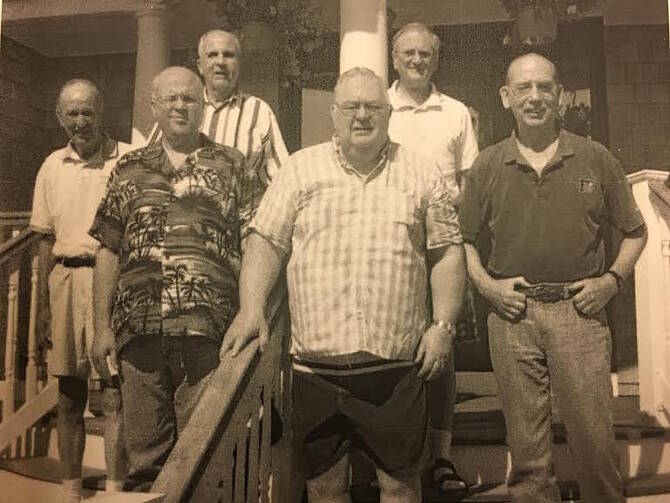As the icy snow whirled around outside my window in New York’s first blizzard last weekend, a message from the Maryland Province of the Society popped onto my screen, but only half a word fit the title space: Edw... I tapped again, but I knew what was coming: Ed Glynn, S.J., had died.
So soon. At the end of October I had traveled down to Colombiere, the big, beautiful Jesuit house in the Baltimore suburb that is both a residence and an infirmary. I had not seen Ed last summer at our annual vacation rendezvous, our villa house at Sea Bright on the Jersey shore. His doctor had decreed that his heart was too fragile for him to make the trip. So, since my definition of friendship is to travel far to see the other, I took the train to Baltimore. He was his old self, good humored and anxious to talk; but I worried about his health. I returned to New York thinking I might not see him again.
Is there a Jesuit who has served more generously? Born in Clarks Summit, Pa., with eight brothers and sisters, Ed joined the Society from Scranton University in 1955. I met him during philosophy at Shrub Oak, in Westchester County, N.Y. Tall and slender, he was a master athlete—basketball stands out. With degrees from Fordham, Woodstock College theologate and Yale Divinity School, he got his theology Ph.D. at the Graduate Theological Union (Berkeley, Calif.) While there, as the Vietnam War became a moral issue, he demonstrated against it. After ordination, with my class, in 1967, he taught theology at Georgetown University.
A friend of America editor Don Campion, Ed started writing for America. And he wrote a lot. While still a doctoral student, there was “How to Unnerve Male Chauvinists,” (Sept. 12, 1970) introducing America readers to Bella Abzug, Betty Friedan and Eleanor Holmes Norton as they planned the “Women’s Strike for Equality.” He confesses that “Writing on women’s liberation as the secular phenomenon of the day has been difficult and touchy enough for one who suffers the liability of being, not only a man, but also a priest of a notoriously male-dominated ecclesiastical society writing in a male-dominated magazine. I take leave, then to transmit the topic of women’s lib in the churches to someone bolder and more courageous than myself.” In 1972 he wrote more than 10 articles, including a sympathetic study of a congressman who lost his election possibly because he defended the Berrigan Brothers whom J. Edgar Hoover had charged with a plot to blow up a heating system and kidnap a Nixon aide.
He covered the Democratic National Convention in Florida in 1972. During Watergate, Ed served as America’s Washington correspondent, where he was at least bold enough to experiment with colorful metaphors. He compared the Watergate to a spicy stew that had been sitting on the back burner all summer.
But he was made to run things. He became president of Gonzaga University in Spokane; John Carroll in Cleveland; and St. Peter’s College in Jersey City, where he relished the combative atmosphere of Hudson County politics. As provincial of the Maryland Province he was known as genial, pragmatic and decisive. When a bishop threated action against a Jesuit college, Glynn stared him down and threatened to remove all Jesuits from the city. Later the Newark archdiocese enlisted him to establish their Cristo Rey School. Once the school was up and running, Glynn was struck with a heart attack and required to move to Colombiere.
He seemed over the years most at peace, most himself, during his summer weeks at the Sea Bright Jesuit villa, where one year long ago the angry ocean waves picked him up and slammed him down and broke his neck. It could have been fatal, but his friends rushed him to the hospital. He stopped swimming, but never tired of watching the waves. Over the years his regular companions included Bob Wild, the president of Marquette; Dan Degnan, also a president of St. Peter’s; theologian Roger Haight, Joe Neville, Don Monan, former president of Boston College, occasionally Joe Parkes, a former provincial and Cristo Rey president, and me. We would sit on the third floor balcony with a pre-prandial before dinner looking out to sea and sometimes continue talking after dinner, watching the fireworks on the Fourth of July.
Ed would repeat stories, goad us to repeat stories we had told or occasionally tell us one about himself we already knew. We poured out our hopes and fears about our work, universities, family, friends and foes. Somehow heaven has to have a porch overlooking an ocean with a ship on the horizon far away.








